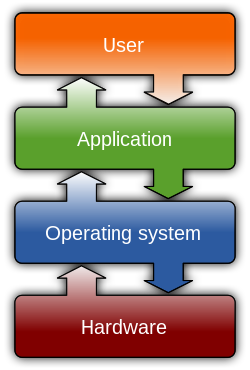Operating Systems
What is OS ?
An operating system (OS) is system software that manages computer hardware and software resources and provides common services for computer programs. The operating system is a component of the system software in a computer system. Application programs usually require an operating system to function.
Operating systems schedule tasks for efficient use of the system and may also include accounting software for cost allocation of processor time, mass storage, printing, and other resources.
Operating systems are found on many devices that contain a computer—from cellular phones and video game consoles to web servers and supercomputers.

Subtopic
UNIX
the prototypic operating system created in Bell Labs
Linux
Kali
Ubuntu
BackTrack
BSD
Android
Open source
Microsoft
Xenix (licensed version of Unix; licensed to SCO in 1987)
MSX-DOS (developed by MS Japan for the MSX 8-bit computer)
MS-DOS (developed jointly with IBM, versions 1.0–6.22)
Windows (16-bit and 32-bit preemptive and cooperative multitasking, running on top of MS-DOS)
Windows 1.0 (Windows 1)
Windows 2.0 (Windows 2 – separate version for i386 processor)
Windows 3.0 (Windows 3)
Windows 3.1.x (Windows 3.1)
Windows for Workgroups 3.1 (Codename Snowball)
Windows 3.2 (Chinese-only release)
Windows for Workgroups 3.1.1
Windows 95 (Codename Chicago – Windows 4.0)
Windows 98 (Codename Memphis – Windows 4.1)
Windows Millennium Edition (Windows ME – Windows 4.9)
Windows NT (Full 32-bit or 64-bit kernel, not dependent on MS-DOS)
Windows 2000 (Windows NT 5.0)
Windows XP (Windows NT 5.1)
Windows Server 2003 (Windows NT 5.2)
Windows Fundamentals for Legacy PCs (based on Windows XP)
Windows Vista (Windows NT 6.0)
Windows Azure (Cloud OS Platform) 2009
Windows Home Server (based on Windows Server 2003)
Windows Server 2008 (based on Windows Vista)
Windows 7 (Windows NT 6.1)
Windows Server 2008 R2 (based on Windows 7)
Windows Home Server 2011 (based on Windows Server 2008 R2)
Windows Server 2012 (based on Windows 8)
Windows 8 (Windows NT 6.2)
Windows Phone 8
Windows 8.1 (Windows NT 6.3)
Windows Server 2012 R2 (based on Windows 8.1)
Xbox One system software
Windows Phone 8.1
Windows 10 (Windows NT 10.0)
Windows 10 Mobile
Windows CE (OS for handhelds, embedded devices, and real-time applications that is similar to other versions of Windows)
Windows CE 3.0
Windows CE 5.0
Windows CE 6.0
Windows Mobile (based on Windows CE, but for a smaller form factor)
Windows Phone 7
Singularity – A research operating system written mostly in managed code (C#)
Midori – A managed code operating system
Apple
Mac OS
OS X
Rhapsody
iOS